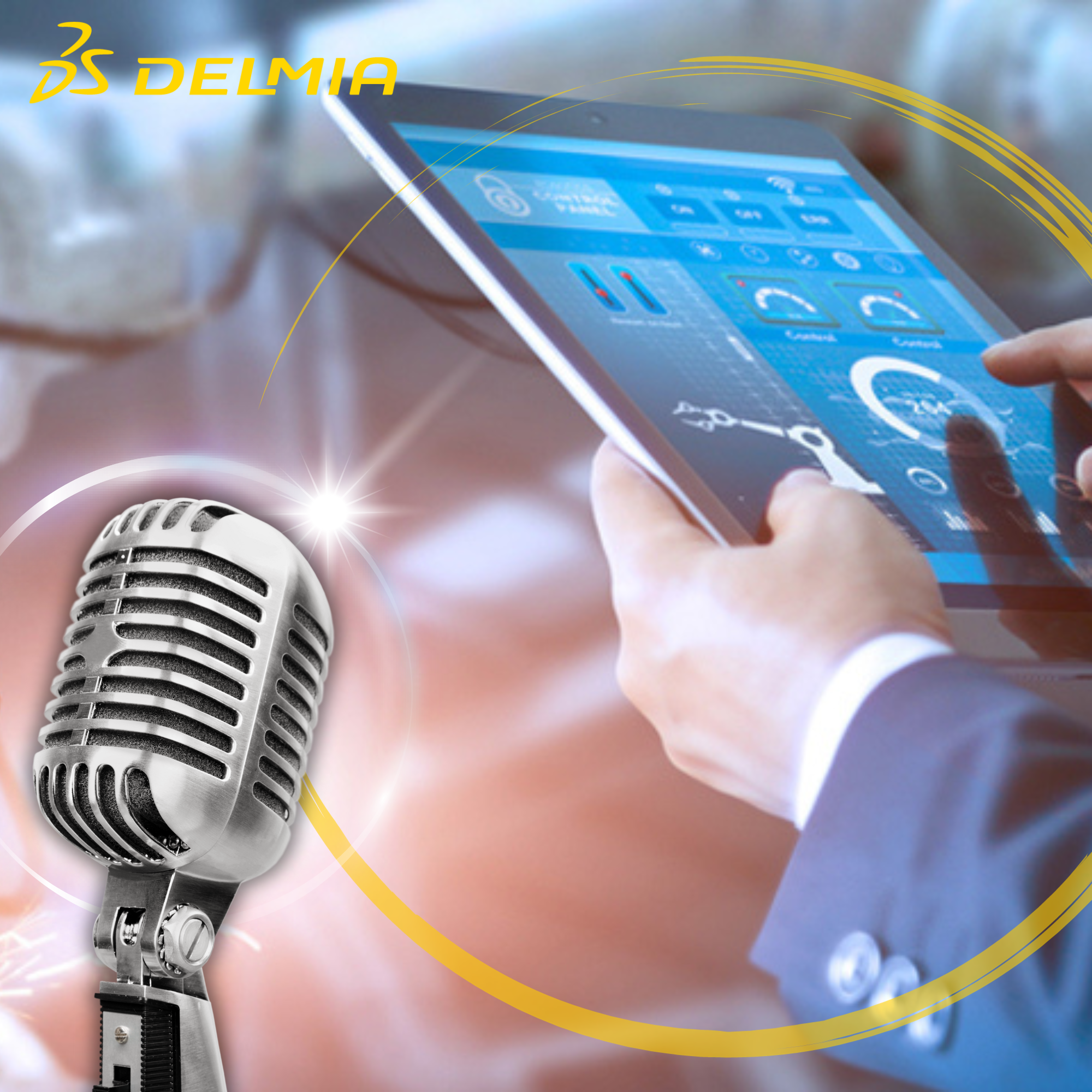
Ep: 26 Optimize Operations with Production Line Definition
In episode 26, hear Alexandre Clement, Industrial Equipment Technical consultant, Industrial Equipment, by tuning in to part one of our two-part series on Robotics and Production Line Definition.
Optimize operations by integrating DELMIA Robotics in factories
Discover the benefits of integrating robotics in factories in order to optimize operations. Whether you are working at a start-up company or large manufacturer, going the extra mile with robotics will pay off. Hear about the complexities that occur when building a line, the new trends line builders should be aware of, and the support offered for both traditional plants and plants in non-traditional industries. Listen now to episode 26, Production Line Definition, Part 1.
Discover more by visiting our DELMIA Robotics web page and our DELMIA Virtual Factory and Robotics community.

Meet Our Speaker

Alexandre Clement
You can follow the DELMIA "Global Operations on the Go" podcast on Apple podcasts, Spotify, YouTube Podcasts, Deezer, by RSS or wherever you get your podcast


![]()


Meet Alexandre Clemente
Therese Snow 00:05
Welcome to our DELMIA podcast, Global Operations on the Go. I'm your host Therese Snow. Today, my guest is a DELMIA robotics expert, Alexandre Clement, Industry Solution Technical Consultant, Industry Equipment Technical Digital Continuity team here with DELMIA. He will be discussing robotics, as well as production line definition as your topics today. Alexandre, welcome.
Alexandre Clement 00:31
Hi. Thank you.
Therese Snow 00:33
Absolutely. Glad to have you. So, before we get started, can you please tell our listeners a little bit about your background?
Alexandre Clement 00:41
Yeah, sure. So, my name is Alexandre Clement. I'm an Embedded Systems Engineer. I studied at ESIEE PARIS, a school specialized in electronics and IT near from Paris. And I had the opportunity last year to do my last internship at Dassault Systèmes, as a QA tester at Simulia brand where I was developing automatic tests. Then I decided to leave the R&D teams for the industrial teams, and I'm today working within industrial equipment organization where I'm responsible of the robotic segments.
Integrate robotics into plants
Therese Snow 01:23
Perfect. Well, it sounds like you are more than qualified for our conversation today. Again, we're really glad that you are here recording our podcast. So, I'm going to jump right in Alexandre and start talking a little bit about robotics. For example, is it important for robotic providers, especially the startups, to go the extra mile and integrate robotics into their plants?
Alexandre Clement 01:49
Yes. Indeed, today, we meet many players in robotics, young and very active, who are embarking in the integration of robot fleets in factories in order to optimize overall production. So, this can provide different tools such as a fleet manager software, to control the entire connected fleet, or a dashboard of past- or real-time production results. Also, Process Automation is a key factor in saving time, human resources, and therefore money for companies. Robotics finds its place in factories to assist workers in increasingly complex tasks to implement. Robotics startups see a huge market for transformations of existing factories. It’s absolutely essential to position themselves in and offer, you know, the best response to customers who want to enhance their factories in order to improve their current production.
Therese Snow 02:55
Excellent. Now, that's really, really interesting, especially to find out how it fits into the plants and the workers, etc. So, Alexandre, what complexities are they usually facing when building a line? And also adding on to that, how can DELMIA and the 3DEXPERIENCE platform help?
Meeting the needs of a factory
Alexandre Clement 03:16
Yeah, for example, very often, we have to deal with the problem of fleet sizing or layout sizing. There are different methods, depending on the applications we want to bring to the process. But the idea is to have a necessary and sufficient number of robots to meet the needs of the factory. So, there is also the question of, you know, the adaptability of the robots in the factory. In fact, many parameters must be taken into consideration, such as the number of forklift or workers present in the factory during the production process. And it can sometimes be complex. So, it's not easy for a startup to position itself in this type of market. You have to be able to stand out with the technology that highlights the way to solve a redundant problem for customers. It's a bit of a race to find the most complete tool addressing a user-friendly use, you know, so that's why this market is very competitive. And every year competent players are faced and present new approaches to respond to the problem of automation in factories. In addition, they are also faced with the difficulty of knowing how to position themselves by offering a robotic solution, whether that is software-only, or let's say includes software and hardware. So yeah, indeed, in terms of credibility, it can sometimes be an asset to show that we master in the field when we also have the solution embedded on the real-time machine, I would say. In this case, supporters of a software-only solution must call on other hardware robotics player to demonstrate the effectiveness of their solutions.
Therese Snow 05:24
All right, great. Are there any new trends, for example, that the line builders should be aware of?
Alexandre Clement 05:30
Yeah, so we are in transformation here around robotics, and it's used for line builders. Most robotics players use AGVs autonomous guided vehicles, which allow predefined tasks to be carried out in a cyclical manner. Except today, we are seeing the massive upheaval of producers of AMRs, so, autonomous mobile robots, which have intelligence embedded. So like, you know, we can see an AI, artificial intelligence, allowing them to practice tasks in a completely autonomous way. So, the AMR is fully aware of its environment, and its state of health. In addition, such a fleet can be connected with each other. So, in order to share data, you know, on the plant, machine, etc., such as for, regarding the robots, the current states, the task in progress, task in pending, tasks to do and so on. So, we can build our own scheduling planning with this kind of information. Otherwise, we can also use AR, so augmented reality or VR, virtual reality technologies, which are very useful, for example, for managing plant maintenance, and locating issues, or for monitoring process of the line and therefore faithfully understand how it works.
Augmented Reality and Artificial Intelligence: Where they fit in
Therese Snow 07:02
All right, well, I'm certain we're going to hear a lot more about augmented reality and artificial intelligence as well, in the future, continuing on, it's really insightful. So, kind of expanding on that. Alexandre, can we also support startups that are producing robots not working outside of traditional plants, but for specific industries, like agriculture, building, etc.?
Alexandre Clement 07:29
Yes, of course, the idea of our industry is to respond to all industrial issues, whether they concern of factory production lines, civil engineering, let's say advanced technologies, and much more. So, yeah, of course, we can. In addition, we go to many events, for example, in France, and in the world around robotics, where startups present their solutions, and the objective is to identify them, and understand why they are addressing this type of solution in order to understand their point of view and the current situation. It's important to know that we are open to many subjects in order to enhance our portfolio. That's why our DELMIA solution is constantly evolving to meet as many users as possible.
Therese Snow 08:20
Great. Well, this has been really incredibly informative. What a great conversation with you. Before we conclude, is there anything I haven't asked or anything else you want to discuss about robotics? Or the topic of today?
Alexandre Clement 08:35
Yes, well, we can see that today the trends are changing. For example, we are talking a lot about humanoid robots in order to assist people in need, I would say. And these subjects that can be controversial, but on which we must remain attentive. So, it's very important to keep a maximum technological watch, and it's what I do.
Therese Snow 08:59
Perfect. Thank you so much, again, for being our guest today. Didn't mean to just throw out that last question to you, right. And I appreciate the feedback that you've given. Thank you, Alexandre very much.
Alexandre Clement 09:12
Thank you.
Therese Snow 09:13
Oh, absolutely. It's been a pleasure. Thanks to our listeners for tuning in. For additional information, our listeners can go to our DELMIA website or follow us on social media. Stay tuned for future podcasts as we continue this topic, robotics and production line definition. I'm your host Therese Snow and you've been listening to DELMIA’s podcast, Global Operations on the Go.gr